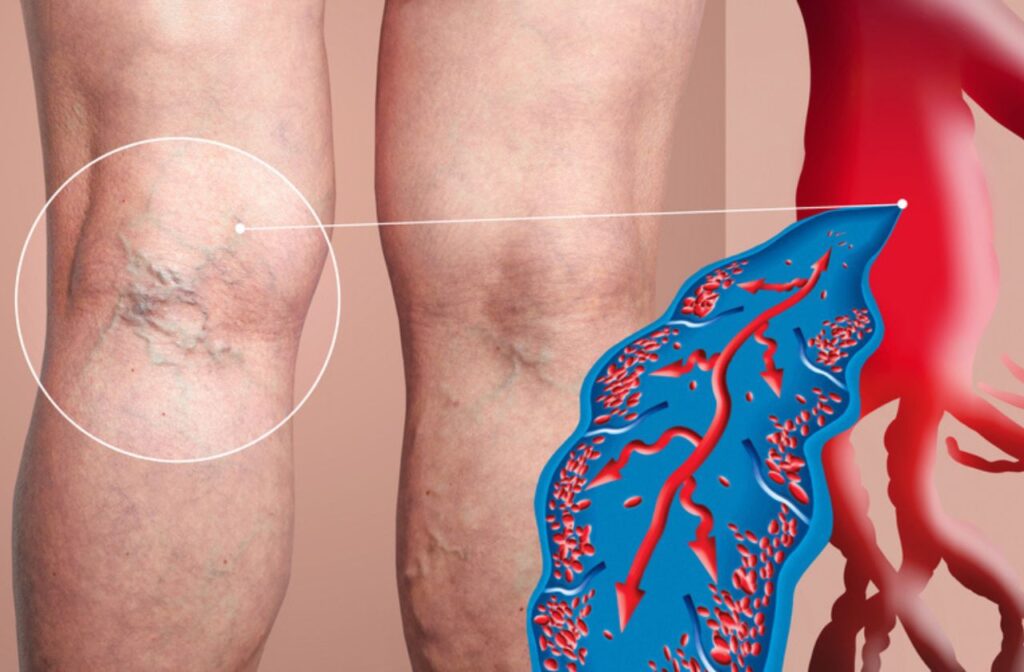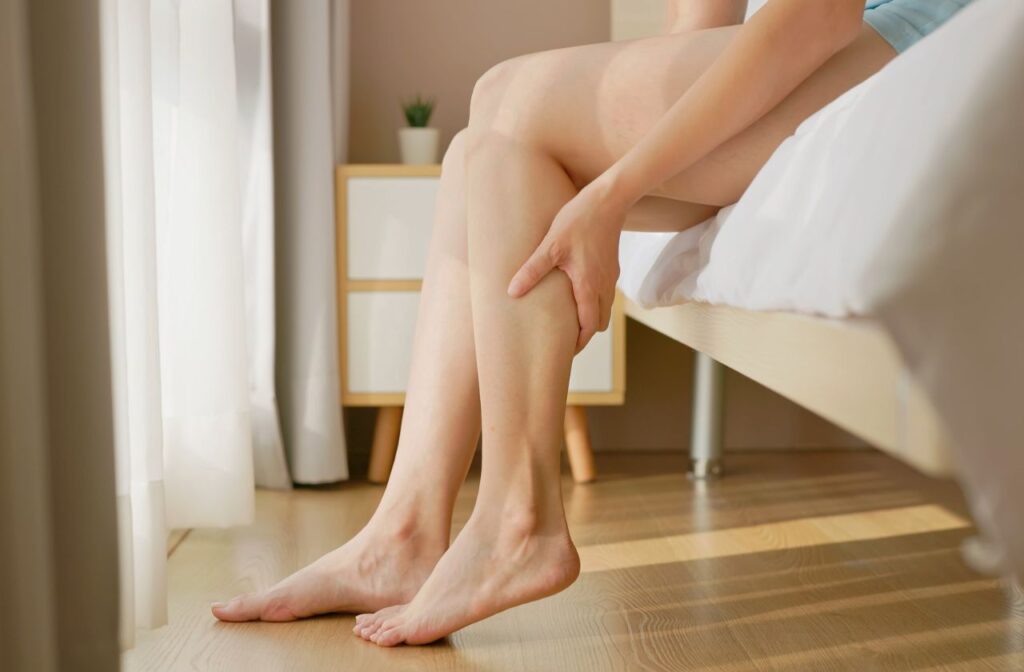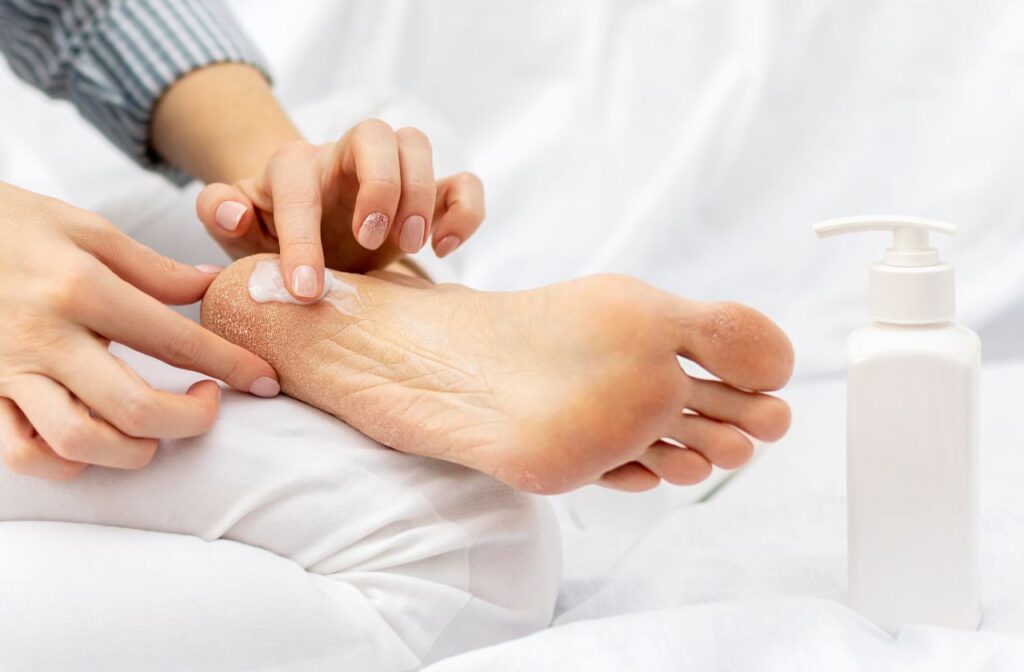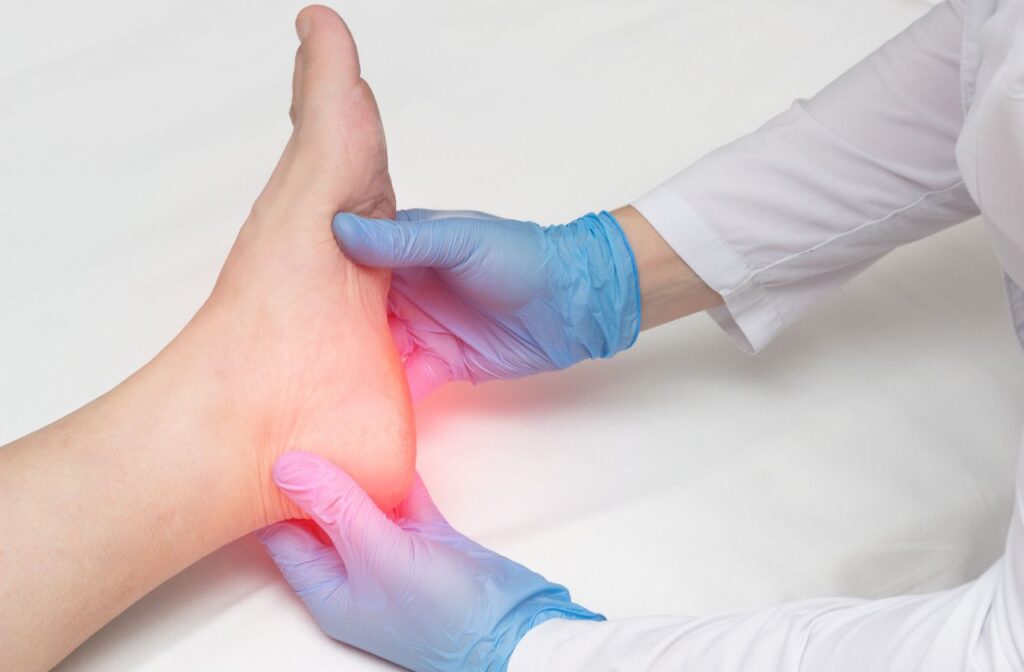
Nighttime is a common time to experience leg pain. As the body winds down, blood flow changes and muscles recover from the day’s physical activity. For some, this leads to nothing more than muscle fatigue or minor cramps, while for others it may signal an underlying health condition that needs attention.
There are many potential causes of aching legs at night. These range from circulation issues and joint disease to medication side effects or neurological conditions. The exact cause can vary, which is why it’s important to seek professional advice if your pain is ongoing.
Why do my legs ache at night?
Vein weakening
A frequent cause of night leg pain is weakening of the veins, known as venous insufficiency. When lying down, blood has a tendency to pool in the affected leg because the calf muscles aren’t actively pumping blood back to the heart.
This results in swelling, cramping and discomfort – often referred to as nighttime leg pain. Elevating the legs, using compression stockings, or moving around can help relieve symptoms.

Peripheral Artery Disease
The opposite circulation problem – peripheral artery disease (also called peripheral arterial disease) – restricts blood supply. When arteries are blocked and can’t supply blood efficiently, less oxygen reaches the muscles and nerves.
This reduced blood flow often causes leg cramps or aching calves at night, particularly after long periods of inactivity. Hanging your legs over the bed can help gravity improve circulation.
People with diabetes, high blood pressure, coronary artery disease, or those who smoke are more at risk. In severe cases, medication such as blood thinners or lifestyle changes like quitting smoking may be part of a podiatrist-guided treatment plan.

Overuse or Dehydration
Muscle cramps are one of the most common reasons for nocturnal leg pain. Overworked muscles build up lactic acid, and dehydration or low magnesium can make night leg cramps more likely.
This pain may last only a few seconds, but it can feel like intense pain when it strikes. Simple steps such as staying hydrated, following a balanced diet, or gently stretching before bed may help relax muscles and reduce nightly leg pain.
Gout
Gout is a form of arthritis that causes sudden, intense pain in joints such as the big toe or ankle. Attacks often happen at night after rich meals or alcohol intake.
Anti-inflammatory medications can help during a flare, while long-term management focuses on lowering uric acid levels.
Restless Leg Syndrome (RLS)
Restless leg syndrome (RLS) is a neurological condition that produces an uncontrollable urge to move the legs, often linked to a tingling or creeping sensation.
These symptoms worsen in the evening, which makes falling asleep difficult and contributes to nocturnal leg cramps or discomfort. Causes may include genetics, pregnancy, kidney failure, or certain medications.
If you have RLS or frequent restless legs, a podiatrist can advise on safe treatment options.

Medication Side Effects
Certain medications, including statins, diuretics and antipsychotics, may cause muscle movement disturbances or cramps. Some vitamin deficiencies also contribute to night leg cramps.
If you suspect certain medications are the cause, talk to a healthcare professional before making changes.

Osteoarthritis (OA) and Other Joint Diseases
Osteoarthritis is a common underlying cause of night leg pain. The common symptom is a deep, aching stiffness that worsens at night after long periods of inactivity.
A podiatrist can help you manage symptoms with a personalised treatment plan.
Deep Vein Thrombosis (DVT)
A blood clot forming in a deep vein of the leg (DVT) is a serious condition. Symptoms may include swelling, warmth and severe leg pain, usually in the calf. Sudden, intense pain and swelling in one leg is a red flag for DVT, which is a medical emergency.
DVT requires immediate medical attention. If untreated, it can lead to dangerous complications.
Varicose Veins
Varicose veins are twisted, enlarged veins that pool blood and contribute to nightly leg pain. They can cause heaviness, swelling and aching that worsens after standing for long periods.
Elevation, exercise and compression stockings may help, but assessment is important for the right treatment options.

Nerve Damage
Conditions like sciatica can irritate nerves, causing pain that radiates down the leg. Heat, ice or cold or heat packs can sometimes relieve symptoms, but ongoing nerve pain should be checked.
Why do my legs hurt when I wake up in the middle of the night?
Waking with sore legs is often due to nocturnal leg cramps, circulation changes or muscle fatigue. Sometimes it relates to restless legs or underlying conditions like diabetes.
If night leg cramps or nocturnal leg pain wake you frequently, it’s best to seek a proper diagnosis from a podiatrist.
Home remedies for aching legs at night
For occasional or mild night leg pain, try:
- Gentle stretching before bed to relax the muscles
- Staying hydrated and following a balanced diet
- Using a warm bath, heating pad or heat packs to relax muscles
- Elevating the affected leg on a pillow
- Wearing supportive shoes during the day
These steps may relieve symptoms, but persistent pain needs professional advice.
When to book your appointment
Book an appointment with a podiatrist if you:
- Have pain most nights of the week
- Wake often due to night leg cramps or nightly leg pain
- Notice swelling, redness or warmth in your legs
- Have risk factors like diabetes, vascular disease, or high blood pressure
- Experience severe cases of nocturnal leg pain that interfere with your well-being
At Advance Foot Clinic, we’ll assess your condition and create a tailored treatment plan to address the underlying cause.
Book an appointment online or call 1300 76 33 66 today.
FAQs: Why are my legs aching at night?
Is leg pain at night serious?
Not always – sometimes leg pain at night is just due to overuse or mild cramps. However, if the pain is severe, persistent, or accompanied by swelling, redness or warmth in the affected leg, it could point to a more serious condition such as deep vein thrombosis or peripheral artery disease. In these cases, you should seek medical attention.
What can I do at home to ease aching legs at night?
Simple remedies include gentle stretching, staying hydrated, using heat packs or a warm bath to relax muscles, and elevating your legs on a pillow. Supportive footwear and compression stockings may also help improve blood flow and reduce discomfort.
When should I see a podiatrist about night leg pain?
If you have night leg pain most evenings, if the pain interrupts your sleep regularly, or if you notice swelling or sudden changes, it’s time to book an appointment. A podiatrist can identify the underlying cause and create a personalised treatment plan to manage your symptoms safely.
Conclusion
Nighttime leg pain is common but should not be dismissed, especially if it is frequent or severe. From circulation issues to arthritis and nerve damage, the underlying cause varies, and only a healthcare professional can confirm it.
Getting the right help means you can manage the condition effectively, reduce discomfort and protect your overall well-being.


